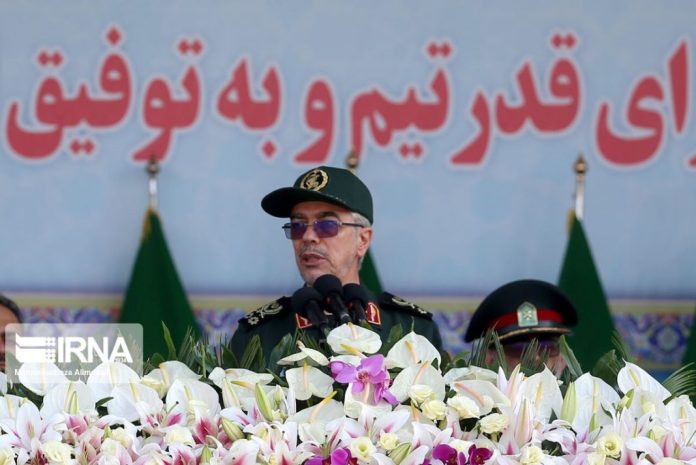Iran’s Defence Ministry issued a statement on Sunday saying it would not allow any changes to international borders in the region, amid the conflict between Armenia and Azerbaijan, according to Fars News.
The ministry spokesman did not name two neighbouring countries, but perceived Azeri threats to invade southern Armenia, which borders Iran, have been the only pressing issue in the region recently. Ministry’s spokesman Gen. Reza Talainik (Tala-ee-nik) was quoted as saying by Fars news website affiliated with the Revolutionary Guard (IRGC):
“We have announced that we will not permit any border changes in the region. In some of our border points, they wanted to make alterations, but they did not dare and will not dare.”
He emphasised that Iran’s statement means that it is relying on certain bases of support, for example, its military capabilities.
Armenia has become vulnerable to a possible invasion to the south by its more powerful neighbour after its defeat in the 2020 war on Azerbaijani territory. In such a scenario, Iran’s ability to transport goods northwards, via Georgia to Russia, would disappear. Tehran has repeatedly warned that it would not tolerate such a move by Azerbaijan, and had sent additional forces to the border to reinforce its claim.
In an interview with local media, General Kümars Haidari, commander of the Iranian Army Ground Forces, said that ten brigades had been deployed to crucial border areas, including near Armenia and Azerbaijan.
General Haidari did not give details whether all these forces belong to the traditional Iranian army or whether they also include units of the Revolutionary Guard ground forces. Also, the media has not received information regarding the numerical estimate of these forces, but one brigade usually has about 3,000-4,000 troops. The general notes that these brigades are based in the northwest, west, southwest and northeast to confront “enemies.” Iran deploys its military forces along its borders with Iraq to deter separatist Kurds, who use Iraqi territory as a base, and against the Taliban in the east of the country, in addition to Azerbaijan.
Defence Ministry spokesman Talaynik spoke about Iran’s Qasem ballistic missile in the interview. According to him, it is “a weapon capable of destroying Israel”. The missile was first unveiled in July 2020 and has a range of 1,400-1,800 kilometres. It is believed to be a newer version of the Fateh-100 missile. It is named after Qasem Soleimani, an Iranian regime operative in the Middle East who was killed in a targeted US airstrike on Baghdad in January 2020.
Israel regularly supplies arms to Azerbaijan, and the Islamic Republic has repeatedly voiced its displeasure with Baku, accusing its neighbour of allowing the Israelis to use its territory against Iran.
According to Talaynik, “no equation in the Middle East can be solved without Iran’s involvement, because of the country’s defencive power.” However, in the past three years, the United Arab Emirates and Bahrain – have made peace with Israel, and Saudi Arabia is also moving in that direction despite Iran’s opposition.
Washington sent a military aid package to the region in July that included additional warplanes and naval forces, warning Iran against interfering in maritime traffic, after it stopped or harassed more than 15 commercial ships in the past two years.
Baku is believed to be seeking to change the borders by seizing more land in the direction of the Azeri territory of Nakhchivan, which borders Turkey to the northwest, Armenia to the north and east, and Iran to the south. Elsewhere, the Iranian military chief cautioned the Persian Gulf littoral Arab kingdoms against the divisive agenda of the Israeli regime in the region.
